- Home
- Peter Lerangis
The Legend of the Rift Page 15
The Legend of the Rift Read online
Page 15
“My badness,” he grunted.
The rest of us were staring, dumbfounded. It looked like every single Massa and every single rebel had shown up to see us off. Streamers hung from Slippy’s wings, along with shining cutout letters spelling GOOD LUCK, SELECT!
On the fuselage, next to Nirvana’s portrait of Fiddle, was another one of Brother Dimitrios. I wasn’t sure how I felt about that, but I guess fair is fair.
As we staggered out of the Jeep, Torquin turned toward us, sheepish looking and even more red faced than usual. “They hate me. . . .”
“Turn around, please!” Aliyah barked, emerging from the crowd and walking directly for Torquin. “I would like a word with—”
But as Torquin slowly shuffled around to face her, his face beet red, his shoulders slumped, and his brow scrunched up like a field of just-planted corn, she spat out a laugh.
Her guard’s shoulders began to vibrate up and down as they struggled to contain their merriment. A couple of rebels let out a giggle, and then Nirvana blatted out a “HAAAA!” that made every person completely lose it.
They were surrounding us now, and I realized that they were even more excited than we were. Finding the last Loculus would fulfill the dreams of both organizations.
Standing maybe ten feet away was Mom. I couldn’t jump into her arms, but she was mouthing “I love you,” which felt just as good.
I knew we had a long way to go. I knew that even if we were successful in Alexandria, we still had our most impossible task ahead of us.
But, boy, could I feel the love. And I let out a whoop at the top of my lungs.
A few hours later, as we swooped, jerked, and spun over the Mediterranean, the love was pretty much out the window—along with my stomach.
“I’ve got my mouth pointed toward the back of your head, Tork,” Marco said. “Keep flying like that and you get the shampoo of a lifetime.”
“Doing best I can,” Torquin said. “Promise.”
As bad as Torquin’s driving is, his piloting is like riding a roller coaster rejected by Six Flags. He jammed the throttle back, and the jet began a nosedive. Both Eloise and Cass started screaming. I don’t need to tell you what happened to Marco. Suffice it to say Torquin managed to radio ahead for someone to meet us on the tarmac with a hose.
Our landing wasn’t a pretty sight.
Afterward we freshened up in the restrooms and then waited at the terminal arrival gate for Torquin. Cass was staring at his tablet, madly doing research. “Okay, the island of Pharos, where the Lighthouse stood? It isn’t an island anymore,” he said. “In ancient times they carted out some rocks and dirt and connected the island to the mainland. The strip of land is called a mole. Do you know how long the mole was?”
“Is this necessary information?” Eloise said. “Because I could use some quiet right now. And maybe ice cream.”
“Back then, instead of miles they measured land by the length of a stadium—which was six or seven hundred feet, give or take,” Cass said, his eyes brightening. “The land connector to Pharos was a heptastadion—seven stadiums!”
“Massarym was all about those sevens!” Marco punched a fist into the air. “Proves we’re on the right track. He must have been there.”
“Turns out, the Lighthouse lasted a long time,” Cass said. “Like, nearly two thousand years, until an earthquake nuked it. Some of the stones were used to build a fort on the site. It’s still there, and it’s called the Qaitbay Citadel.”
Torquin came lumbering toward us from the restroom. “I rent car now.”
“No!” Eloise shouted.
Cass immediately ran to the curb, where a cabdriver was standing idly by a beat-up old taxi. “You need cab?” the driver called out, yanking his door open. “Of course you do!”
We all climbed in before Torquin could say a word.
It was a tight taxi ride through Alexandria, with Torquin hogging the front passenger seat and Cass, Eloise, Marco, and me squeezed into the back. The driver led us down streets of squat, whitewashed buildings. Most of the women wore head coverings and long dresses, everyone walked in sandals, and the smell of the sea got stronger the farther we got from the airport.
The cabdriver spoke fluent English, and he wouldn’t stop. “First time? Of course it is! You from New York? London? Ha!”
“Actually, we’re not,” Marco said.
“Of course you’re not!” the driver said. “Those big American cities, European cities? Brand-new. Paint is not even dry on these cities!”
“But we don’t live in any big American or European—” Cass began.
“Here, we are founded by Alexander the Great!” the cabdriver barreled on, ignoring Cass. “Of course we are! Because is why we are called Alexandria, you see? More than three hundred years B.C.! We had largest library in the world—five hundred thousand volumes! You think New York Public Library had that in ancient times? You think Library of Congress or Harvard?”
“Of course they didn’t!” Eloise said.
“Smart girl!” the cabdriver said. “Alexandria greatest center of learning in history. I take you there now?”
“To a library?” Marco said. “Shoot me first.”
“I like libraries,” Eloise piped up.
“Of course you do!” the cabdriver said, swerving to the right across two lanes of traffic. “We go!”
“No!” Torquin, Marco, Eloise, Cass, and I all shouted at once.
“To the Lighthouse,” I said. “I mean, the Qaitbay Citadel.”
We got there at the height of the sun. The taxi’s air-conditioning couldn’t quite crank up high enough to make up for the heat-generating machine known as Torquin, so we were already sweaty by the time we got out.
The sea breeze helped. Seagulls cawed and swooped down toward food left by a group of kids on a railing. I could hear a buoy clanging out to sea. Qaitbay Citadel was a massive stone castle at the end of the long arcade lined with cannons. The castle’s roof was crenellated along all four sides, with a great turret on each corner. Arched windows like two giant eyes gazed at us from above the entrance as we walked the length of the arcade, past tourist families posing for selfies. “You feeling the Song of the Heptakiklos yet?” Marco said. “Like Brother Cass said, some of the castle stones are from the Lighthouse.”
I shook my head. Not even a hint.
Off to the left, a dark-haired woman in a head scarf clapped her hands and then spoke into a megaphone: “Three minutes to the start of the English-speaking tour, ladies and gentlemen! We will be discussing the history of the Qaitbay Citadel from its days as the famous Wonder of the World, the Lighthouse of Alexandria!”
I was so busy listening for the Song that I barely noticed. “Come on,” Cass said. “We might learn something.”
“If I knew we were going to a lecture, I’d have brought my sleeping bag,” Marco said.
“Can’t we just go into the citadel now?” Eloise asked.
“So, I suppose you are the only customers this afternoon,” the woman said, now walking toward us with a huge smile.
“Customers?” Marco said, his eyes widening in panic. “We’re—”
“Eloise,” Eloise said, extending her hand. “And this is my brother, Cass. And my friends Jack, Marco, and—where’s Torquin?”
I looked around, but he was gone. “Restroom, I guess.”
“Good idea!” Marco said.
“My name is Sima,” the woman said. “Come. These tours are better when they’re small. More intimate, no?”
As she began leading us toward the castle, Marco pantomimed a big, theatrical yawn.
“Too late for us to join?” a voice piped up from behind us.
I turned to see a group of tourists heading our way from a chartered van. There were about ten of them, about half men and half women, each wearing baseball caps and colorful T-shirts. All their arms were covered with tattoos, and most of the guys had beards.
The first guy to reach us must have been in his late twenti
es. His beard was thick and dark brown, and he wore narrow, black-rimmed glasses. “Americans?” he said.
“Yup,” I answered.
But my eyes were fixed on his shirt, which showed a print of the Lighthouse of Alexandria. As his friends ran up next to him, I couldn’t help staring at their shirts, too. And their tattoos. I saw a great statue astride a harbor . . . a tremendous structure flowing with plants and flowers . . . a magnificent lighthouse . . . “The Seven Wonders,” I said.
“Can you recite them all?” he said.
“Yes,” I replied. As I reeled them off, he looked surprised, but not as surprised as I felt right then.
His baseball cap—all their caps—were emblazoned with an unmistakable familiar symbol.
“Who the heck are you?” Marco asked.
“Actually, I’m Cooper, from Bushwick—that’s Brooklyn,” the guy said, spinning around to show the back of his T-shirt, which said SEESAW. “And that acronym, in case you were mad curious—which of course you are—stands for Society for the Earthly Edification of the Seven Ancient Wonders. You’ve heard of us?”
“No,” Eloise said.
“The . . . upside-down V,” Cass said, “on your hats. What does that mean?”
At once, all of them held their hands out, fingers pointed down in a lambda shape. Scissoring the fingers open and closed, they cried out in unison, “Ka-ku, ka-ku.”
Then they cracked up, nodding toward one another with great satisfaction.
I felt like I was being flung to the outer reaches of the nerd universe.
“Please tell me I’m dreaming,” Marco mumbled.
“That’s our sign,” Cooper said. “It went over really big at Comic Con. The inverted V was discovered by the Alexandrian archaeological diver who founded our group. We think we have a pretty good idea it relates to the actual origin of the Seven Wonders of the World!”
Now I was listening. “You do?”
One of the group members, a girl with purple hair and three nose studs, pointed straight upward. “There,” she said with a grin.
We all looked up, into a clear sky with fluffy clouds. “Where?” Eloise replied.
The entire group burst out laughing again. “I know, I know, you think we’re weird,” Cooper said. “Okay, we’re on a pilgrimage to all the sites. To show that the Seven Wonders are the proof of . . . wait for it . . .”
“We’re waiting,” Marco drawled.
“. . . Extraterrestrial life!” Cooper said.
“Extraterrest— whoa, you guys think the Seven Wonders came from outer space?” Marco said.
“Ka-ku, ka-ku,” Cooper said. “Just kidding. But, yes. Seven other planets . . . seven wonders. Coincidence?”
“I don’t think so,” said the girl, who shared a high five with Cooper.
“According to the carvings discovered by our founder, each Wonder contained a magical sphere,” Cooper went on. “These, we’re pretty sure, were made of cosmic matter . . . wait for it again . . . from each of the other planets of the solar system! Seven planets, am I right?”
“Did the Greeks even know there were seven planets?” Cass asked.
“Not according to history, smart guy,” Cooper said, “but we’re sure some of the mystics knew. We just haven’t found the docs yet.”
Now the guide was calling out to us, looking at her watch. “Erm, I believe we shall begin the tour!”
“Sooo psyched!” said Cooper. “Hey, we have open membership. Our meetings are fun, and we have chapters all over the place. Here’s our contact info. Farouk, our founder? Awesome. Lives in Alexandria, dives for shipwrecks. Coolest way to make a living, ever.”
He reached into his pocket and pulled out a business card:
The Seesaw members were already following Sima toward the citadel entrance. “Think about it,” Cooper said, turning to follow.
“Ka-ku, ka-ku,” I said.
CHAPTER THIRTY-ONE
CRAZY FAROUK
“FAROUK NOT THERE,” Torquin said, shoving his phone back in his pocket.
“Bummer,” Marco said.
We had found a cab just outside the citadel and now were riding down the so-called mole, the land connector back to town.
“Two . . . three . . . four . . .” Cass was counting.
“What are you doing?” Eloise asked.
“Measuring out stadiums,” Cass replied. “I’m curious how long a heptastadion is.”
“About three-quarter mile,” said the cabdriver.
“I still think we should have taken the tour,” I said. “We would have learned something.”
“We’re not here to learn,” Marco said, as if learn were a synonym for have our fingernails pulled out. “Well, we are. But not to learn about castles and museums. This guy Farouk dives for wreckage, right? He’s probably found stuff we can use!”
“If we have to go to Mars, will Torquin have to drive the spaceship?” Eloise said.
“The Seven Wonders did not come from outer space!” Cass said. “Those guys were a couple of sandwiches short of a picnic. I mean, come on—‘ka-ku, ka-ku’? Have you ever heard of anything so ridiculous?”
“Never,” Marco drawled. “Because the Loculi of Flight and Invisibility and Strength and Healing and Language and Teleportation are so reality based.”
“Hah!” Torquin rumbled. “Tushy.”
“I think you mean touché,” I said.
The taxi went left at the main harbor road, which led along the Mediterranean. I checked the card Cooper had given me. On the back he’d written Farouk’s local address.
Soon we were winding through the streets in an industrial part of town, outside the tourist area. There, the road was pocked with holes and the buildings were huddled close together. Cats watched lazily from doorsteps, and every few feet a different spicy smell would waft into the cab windows. Seeing us, a group of kids gave chase, shouting in Arabic until the driver sped up. As he wound through ever-narrower alleyways, the smell of fish became overpowering.
Finally he pulled up to a small dock, where the crew of a sturdy boat was hauling in a net full of squirming, silvery fish. As we got out of the cab, they’d begun dumping their haul into big buckets. Some of the fish spilled over the bucket sides and slid along the decks, where a big, burly dockworker caught them and tossed the escapees in with the others.
“Farouk?” Torquin called out.
Three men looked up.
“Guess it’s common name,” Marco murmured. “Dudes! ’Sup! Anybody here speak English?”
“How can I help you?” the big dockworker said, turning our way. He had a massive chest that seemed to be in competition with his belly, and a beard so thick you could imagine small animals hiding inside. “I am Naseem.”
He stuck out his right palm, which was enormous and covered with calluses. Fortunately Torquin stepped forward to shake it, and I escaped having my hand crushed. “Looking for Farouk Assad,” Torquin said.
“Ohhh, Crazy Farouk you want!” With a big smile, Naseem shouted in Arabic to the fishermen, who all laughed and went back to their catch. “Crazy Farouk shows up sometimes . . . sometimes no. Are you people . . . ?” He twirled a finger in a circle around his ear, rolled his eyes, and made a “cuckoo” whistling noise.
None of this was giving me hope.
“No,” Torquin said.
Naseem looked at his watch. “My son and daughter run the bakery, up the street. It is Wednesday. Right now they are taking the last loaves of rosemary bread out of the oven. You like rosemary bread?”
“I don’t know her,” Cass said.
“Well, Crazy Farouk does!” Naseem said. “Where is rosemary bread, there is Crazy Farouk.”
We thanked him and walked the short distance to the Citadel Bakery, which sat next to a weed-strewn lot. As we neared the building, the stink of fish soon gave way to the warm, yeasty smell of bread. People were appearing from around dark corners, heading toward the shop. “Forget Farouk,” Marco said. “I’m starving.”
He began running. But as he got near, a thin young woman in a head scarf bustled out of the shop carrying a basket with a loaf of bread wrapped in paper. Wordlessly, she set the basket down on the dock, directly in front of Marco. Giving him a quick glance, she turned and went back in.
Marco’s face exploded with a smile. “Whoa—thanks!” he said, kneeling down to take the basket. “When people see Marco the Magnificent, they can’t help themselves.”
“That’s not yours!” Eloise said.
Marco took a deep sniff, then began unwrapping the paper. “So maybe this was an offering to the fishies? I don’t think so. Dang, it smells good—”
A rock whistled toward Marco from the empty lot. “Whoa!” he said, stumbling backward onto the pavement.
We looked to our right. A woman, shrouded in gray scarves, stood next to a small structure made from branches and old patched sheets. “Hands off the bread,” she said.
“Sorry!” Marco replied. “I was just smelling it. Awesome.”
The woman had silvery hair pulled back tightly into a bun. Her skin was dark and leathery, as if she’d spent her entire life outdoors without sunscreen. As she strode across the junk-strewn lot, she fixed each of us with a sharp, green-eyed gaze. It wasn’t until she was halfway across that I realized she was wearing flippers.
“Um, excuse me? Do you happen to know someone named Farouk Assad?” I asked.
Snatching up the basket with one hand, she ripped off a hunk of bread with the other. “I am Farouk Assad.”
“Oh,” Eloise said. “We thought Farouk was a man’s name.”
Farouk nodded. “That’s one of the reasons they call me crazy. Also, the flippers. Eh. What do they know?”
With a shrug, she stuffed the bread into her mouth and held out the rest of the loaf toward us. “Rosemoof burr?” she said, which I assumed was “rosemary bread?” with her mouth full.
Marco was the first to accept her offer, but Cass and Eloise gave me wary looks.
I was too hungry to resist. The bread was steamy, spicy, and warm. It tickled my nose as I ate it. We all sat on the edge of the thick wood rail that lined the harbor, dangling our feet over the water. “We met some of your group members at the citadel,” I said.

 The Orphan
The Orphan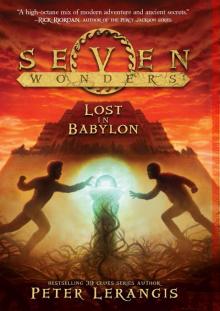 Lost in Babylon
Lost in Babylon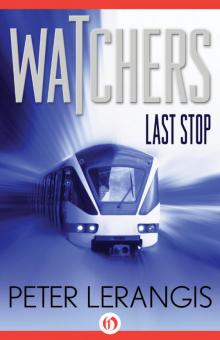 Last Stop
Last Stop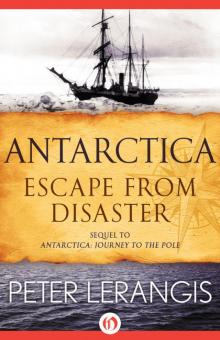 Antarctica Escape from Disaster
Antarctica Escape from Disaster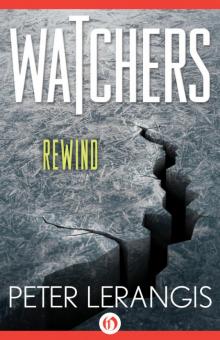 Rewind
Rewind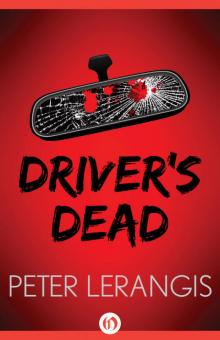 Driver's Dead
Driver's Dead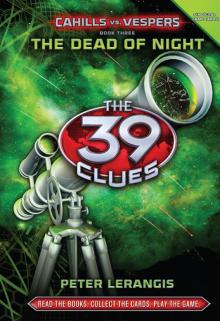 The Dead of Night
The Dead of Night The Promise
The Promise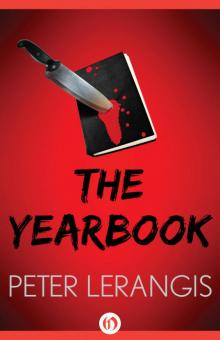 The Yearbook
The Yearbook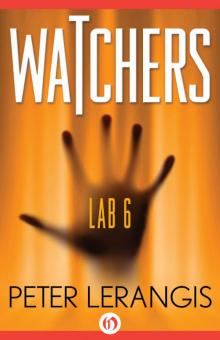 Lab 6
Lab 6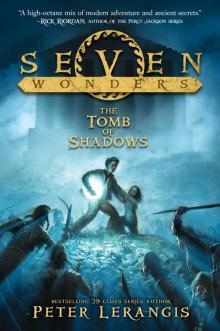 The Tomb of Shadows
The Tomb of Shadows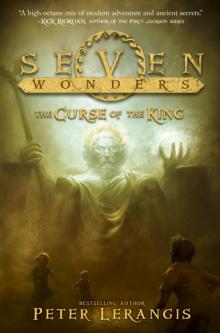 The Curse of the King
The Curse of the King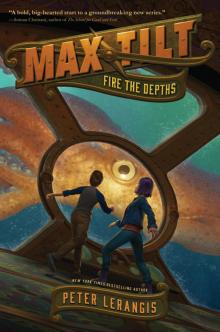 Max Tilt: Fire the Depths
Max Tilt: Fire the Depths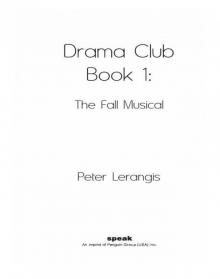 The Fall Musical
The Fall Musical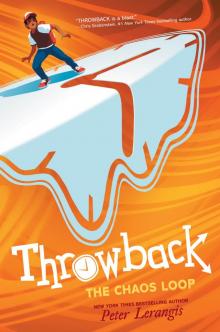 The Chaos Loop
The Chaos Loop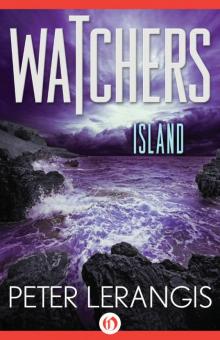 Island
Island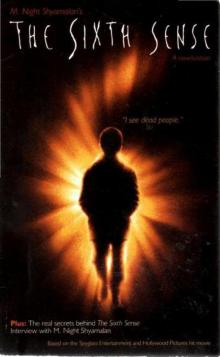 The Sixth Sense
The Sixth Sense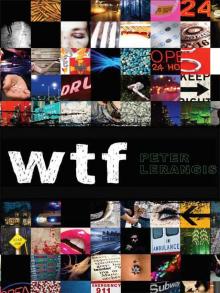 Wtf
Wtf War
War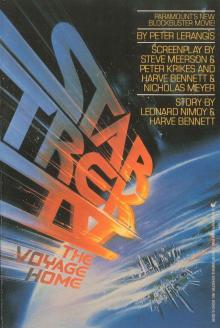 Star Trek IV, the Voyage Home
Star Trek IV, the Voyage Home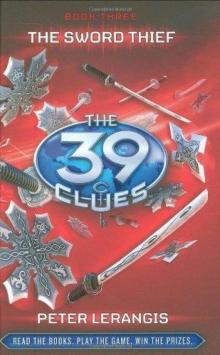 The Sword Thief
The Sword Thief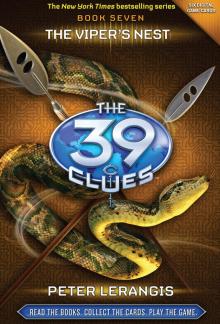 The Viper's Nest
The Viper's Nest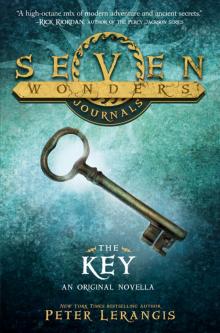 The Select
The Select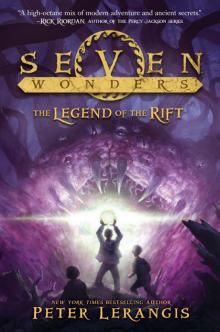 The Legend of the Rift
The Legend of the Rift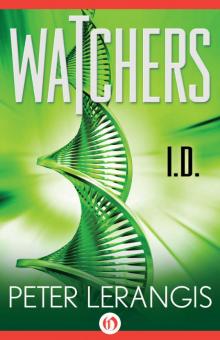 I.D.
I.D. The Sword Thief - 39 Clues 03
The Sword Thief - 39 Clues 03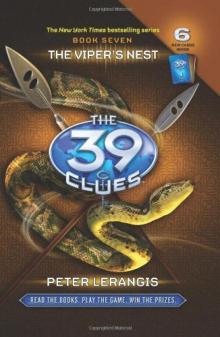 The 39 Clues Book 7: The Viper's Nest
The 39 Clues Book 7: The Viper's Nest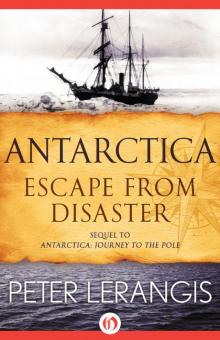 Antarctica
Antarctica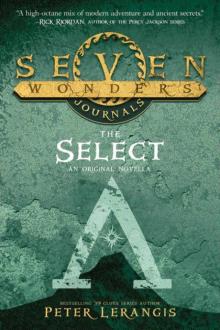 Seven Wonders Journals: The Select
Seven Wonders Journals: The Select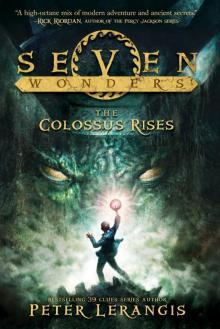 Seven Wonders Book 1: The Colossus Rises
Seven Wonders Book 1: The Colossus Rises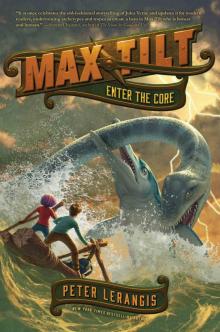 Enter the Core
Enter the Core![39 Clues _ Cahills vs. Vespers [03] The Dead of Night Read online](http://i1.bookreadfree.com/i1/04/02/39_clues_cahills_vs_vespers_03_the_dead_of_night_preview.jpg) 39 Clues _ Cahills vs. Vespers [03] The Dead of Night
39 Clues _ Cahills vs. Vespers [03] The Dead of Night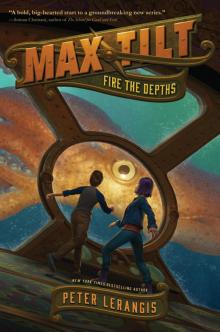 Fire the Depths
Fire the Depths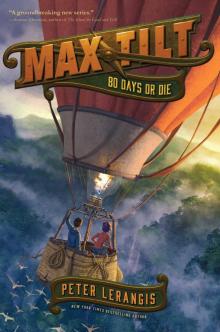 80 Days or Die
80 Days or Die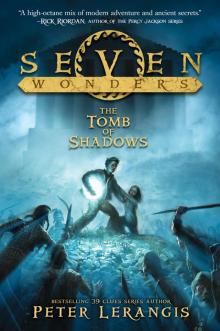 Seven Wonders Book 3
Seven Wonders Book 3